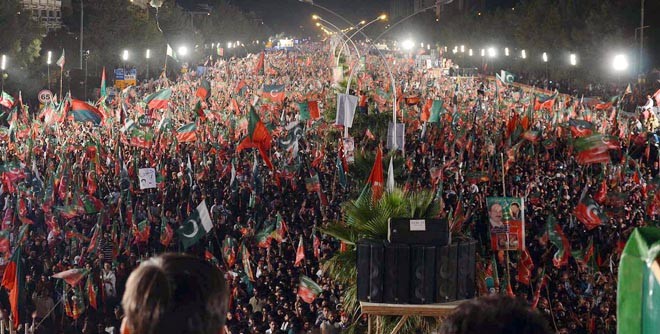
The already feeble link between the voters and voted will dwindle and eventually sever if politicians fail to come to rescue of hapless polity

As the time goes by, some observers and analysts have come to the conclusion that the drop scene of sit-in protests by the Pakistan Tehreek-e-Insaf and Pakistan Awami Tehreek shall be witnessed in the next few hours. Whatever the political (or perhaps quasi political) outcome of this standoff may be, a few aspects of our political performance have become stark clear.
Our leadership -- treasury and opposition -- lacks the competence and skill to formulate political options of merit for the consumption of related stakeholders. Even the ‘revolutionaries’ who marched hundreds of miles on ultra-comfortable vehicles could not generate a comprehensive vision of the future.
One is compelled to remember the likes of Nawabzada Nasrullah Khan, though not a populist politician, but proficient in cobbling together alliances, manifestoes, and rallying points and compromise agendas in situations of political gridlocks. We see millions of disgruntled masses looking for vision and a leadership to lead them towards it. Those who are harping on electoral reforms will certainly find it very difficult to lure the voters by offering old candies in any newly crafted wrapper!
The reasons behind this less than desirable performance of our political leadership are several.
One, they have lost the track of the pulse of polity they claim to represent. People of Pakistan want to know the package of hope politicians can muster and offer as a tangible option. What they repeatedly learn and observe is firefighting, be it the dengue crisis, climate change induced rain disasters, perpetually existing terror attacks or sectarian killings.
Two, politicians have become extreme cowards who do not wish to take any risk beyond status quo. None of them is prepared to emulate Zulfikar Ali Bhutto who deserted the power echelon for becoming a populist leader at a time when he had no threats from the establishment.
Three, most of politicians do not have a sound analysis on national issues to formulate a crisp and sound set of slogans that could become preamble of a political programme. Look at the Tehreek-e-Insaf leadership which talks about lack of accountability and spiraling corruption ad nauseam but does not tread an inch beyond this line.
Four, no party has a workable solution to the countless economic woes of people and long-term economic performance of the country. The present government is hell bent on only doing the basics. It believes in borrowing, begging and fetching funds from donors, the US administration and the Arab world to ward off impending economic disasters.
Almost all natural disasters provided the government an opportunity to beg for more funds. The heavy spending on establishment, non-development heads of public sector and contractually conducted sectoral projects continue unabated. On a slightly better note, the PML-N is pro-trade and pro-business. However, its recent track record has been marred by diverting huge subsidies to the choice sectors only for petty political gains.
And five, the core matter of reviving elected local governments has been set aside by almost all the political parties. The previous People’s Party regime that championed 18th Constitutional Amendment has relegated it to provincial governments. The PML-N is allergic to discuss the merits of local government as it is termed a subject that will trigger further divide within party ranks on the matters of ticket distribution.
The PTI has let down people of KPK on this vital count throughout its year in power after 2013 elections. And upcoming political forces are seemingly unprepared and confused to have a clearly derived opinion around this vital subject. It is surprising to note that politicians, who claim to be ultimate democrats, wish to keep ordinary people deprived of the opportunity to elect ward councilors to deal with common issues of their daily lives. They also fail to answer us as to how new ranks in political leadership shall emerge given the fact that no credible party elections are held. With centrally controlled oligarchies that the parties are, it is impossible to imagine leadership going beyond a few dynasties.
A cursory look at our national scenario shall inform that important rallying points are stark apparent. Making Pakistan a dependable context for business, trade and manufacturing, conserving farming by preventing impacts of disasters, reforms ensuring access to justice for all, radical changes in foreign policy to enhance neutrality and secure adequate space for independent decision-making, re-building educational and healthcare infrastructure, combating terror and making polity capable and professionally oriented, reviving local government, spreading direct taxation net around rich and powerful are a few notions.
Communication experts within the parties can transform commonly understandable rallying phrases, if and when their leadership agrees to it. Otherwise, the already feeble link between the voters and voted will dwindle and eventually sever. One reporter asked an elderly housewife in Sukkur about whom she will vote for in the next elections. The frail soul raised her hand pointing to the sky retorting that she will vote for no one -- only continue to pray to the Almighty Allah as He is the lone hope that keeps her household going!
The question is whether the leadership can rise and come to rescue of millions of such commoners who seem to be losing hope in the political process.